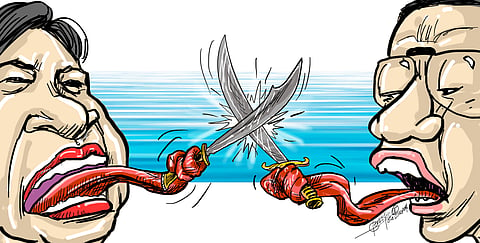
- NEWS
- the EDIT
- COMMENTARY
- BUSINESS
- LIFE
- SHOW
- ACTION
- GLOBAL GOALS
- SNAPS
- DYARYO TIRADA
- MORE

Last Tuesday, 2 July, a high-level meeting between Philippine Foreign Affairs Undersecretary Theresa Lazaro and Chinese Foreign Affairs Vice Minister Chen Xiaodong took place in Manila more than two weeks after the 17 June clash between China Coast Guard (CCG) personnel wielding axes and knives and Philippine Navy (PN) sailors on the defensive at Ayungin (Second Thomas) Shoal.
The shoal, the site of the dilapidated BRP Sierra Madre that serves as a Philippine territorial outpost, has become one of the most critical flashpoints in the West Philippine Sea – the term used by the Philippines to describe its exclusive economic zone in the South China Sea which is claimed virtually in its entirety by China as its own.
The de-escalation of the tension was the overall purpose of the meeting and, for the umpteenth time, the officials of the two countries concurred about improving the dialogue and cooperation, particularly between the CCG and the PN.
The two sides “affirmed” to commit themselves to de-escalating the tension “without prejudice to their respective positions,” that is, as Undersecretary Lazaro told her counterpart, “the Philippines (will continue) to be relentless in protecting its interests and upholding its sovereignty, sovereign rights and jurisdiction” in the South China Sea.
For its part, the Chinese delegation asked the Philippines “to immediately stop the infringing and provocative acts in the sea (and) to work with China to manage the situation at Ren’ ai Jiao (the Chinese name for Ayungin Shoal) to promote a de-escalation of the situation and the stabilization of bilateral ties.
Talk is talk, and the one that took place here in Manila last Tuesday was just one of a round of talks between the Philippines and China that have been held over the years that have seen the tension growing in the South China Sea.
What was ominous was that even as the officials of both countries were wrapping up the so-called de-escalation talks in Manila, the CCG’s gigantic 12,000-ton, 165-meter long vessel with bow number 5901 known as “the Monster” – the largest coast guard ship in the world – was sighted re-entering the Philippines’ EEZ, joining one other, a 102-meter long CCG craft with bow number 5203, prompting a former PN officer to remark that clearly, this was China’s way of sending a message to the Philippines that “sure, we can talk and continue talking, but the South China Sea is ours.”
Indeed, rounds of talks haven’t allayed the mistrust that has grown, particularly on the side of the Philippines, of China, and because of the mutually incompatible claims that both countries continue to maintain.
Chinese claims over the SCS, including the Philippines’ EEZ, as well as the Philippines’ and Filipinos’ favoring the current dispensation’s shift to the US, from the past administration’s bias for China in terms of foreign policy, is also an irritant gnawing at the Chinese.
A survey by Washington, D.C.-based Freedom House revealed that Filipinos are highly skeptical of China, particularly the Chinese Communist Party, a fact which observers see as rooted in the legacy of US influence in the Philippines.
While the previous administration’s “somewhat warmer relations with Beijing may have affected many people’s views at the beginning of his (Rodrigo Duterte’s) tenure, his sway over public opinion on the issue has apparently faded over time, especially as the territorial dispute became an emotional topic for many Filipinos,” said Freedom House.
Meanwhile, the results of another survey of some 3,000 randomly picked respondents by local think tank, Oculum Research and Analytics, point to 43 percent of Filipinos preferring that the Philippines side with the US over China in issues involving the WPS; only a scant three percent suggested the country take China’s side in the WPS dispute.
If violence erupts in the SCS, the Oculum survey showed 32 percent of Filipinos preferring that the government ask the US for assistance (militarily), while 31 percent said the country should defend its territory against the Chinese.
Also, only 17 percent of the survey respondents felt that China could be trusted while 31 percent indicated China was untrustworthy.
Be that as it may, there is no seeing China about to give up its (ridiculously) large claims to the SCS, nor is it likely that the Philippines will concede its own claim, particularly to its EEZ.
Still, we cling to the hope that the talks will, at least, better the chances the Philippines and China would at a certain point in time reach an agreement, one that would prevent PN resupply missions to the country’s outpost at Second Thomas Shoal from sparking an incident more violent than previous ones — which would push President Marcos to invoke the Philippines’ Mutual Defense Treaty with the US and then we’ll see all hell break loose.
